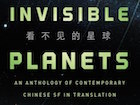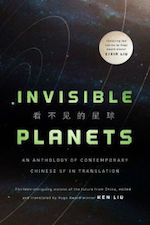Invisible Planets is the first English-language anthology of contemporary Chinese science fiction. Inevitably, the question arises of just how “faithful” the translations are. The simple answer is: “very” and also “not at all.”
I often compare translation to the performing arts, but that’s not quite right. We (rightfully) celebrate a concert pianist’s brilliance in interpreting the dead notes in a score, and we argue over which actress’s version of Viola gives the most interesting twist to Twelfth Night, but we are hesitant to say much about the translator’s contribution to our enjoyment of a book, even though comparing any two versions of the Bible ought to convince the most skeptical reader of how much difference translation makes.
Some of this is because the distinct contributions of the translator (like the contributions of a skillful editor), are often difficult to see. While listeners can often compare many different performances of the same musical composition, most modern works of fiction are translated into English only once. While anyone can read the text of a play and readily see the additions, both verbal and nonverbal, made by an actress, only those who can and have read the original novel or short story can fully appreciate the choices and changes made by the translator. Since translation appears opaque to most of us, we are hesitant to attribute much to the translator.
But I think there’s a deeper cause for the unease we feel toward translators: since we do not fundamentally believe what they do adds value to a work of art, we do not trust them.
A piece of music performed by an orchestra is no longer just markings on the page; rather, it’s a living, beating heart that makes its presence felt through time. A play that is performed by actors is no longer a textual artifact; rather, it’s a complex, multi-sensory experience. But after a translator is done with a text, we still have nothing more than a text.
The translator is thus seen as a necessary evil—merely a passive lens necessary to decode the hieroglyphics of people who are not so fortunate as to write and speak our language. The best that a translator can do is to be unnoticeable, and anything short of perfection would be deemed a “distortion.” Thus, the most value that a translator can add to a work is precisely zero (and many times, readers work from the assumption that translators subtract rather than add).
This sentiment is expressed by readers and writers in countless ways: from reviews that attribute anything the reader disliked to the translation, to omissions of the translator’s name when works in translation are nominated for awards. We do not, fundamentally, believe that translators add anything.
There isn’t enough space in this essay for me to delve into all the ways in which translators do, in fact, transform works of art. Suffice it to say that a “faithful” translation, the ideal of many readers, is simply impossible. Cultures are distinct from each other, as are the ways they have chosen to partition and shape experience linguistically. Every translation is thus an act of cultural negotiation, a performance for (at least) two audiences balanced on the edge of betrayal and subversion. The translated text is a new work of art derived from the original, but with its own internal life, logic, and separate aesthetics. Betrayal is not only inevitable; it is desirable.
I think it’s most useful to think of the translator as a co-author. And like any collaboration, a translation is full of internal tensions and contradictions: between the intent of the author and the intent of the translator, between the expectations of the original audience and the expectations of the target audience, between the literary tradition that the original is in dialogue with and the literary tradition that the translation is thrust into, between the desire to assert that the text is universal (in spite of language) and the need to defend the unique cultural milieu in which it was written (despite translation).

The tension between the translator and the author is rarely acknowledged, though all writers whose works have been translated have felt it to some degree. Many authors view being translated with anxiety, as though their work is being taken away from them, and their chief concern is the desire to retain control. But like any act of collaborative adaptation and performance, control by the original author is neither possible nor even desirable. A good director or musician will not feel bound by the desires of the playwright or composer—for the performance is a distinct medium with its own needs and rules, and the same is true of translation into a new linguistic medium.
For writers and readers alike, I posit that it’s best to think of the translator as an invisible co-author. Like the titular objects in Invisible Planets, the translator’s presence cannot be seen but can be felt. They open up new vistas and sling new trajectories.
And indeed, I suspect most translators rather enjoy the unique role of being an invisible co-author. The lack of focus on their art paradoxically also gives them more space to experiment and push boundaries, to betray and negotiate in the tunnels of the word-mines in darkness. Translation may be the one performance art that thrives in the anonymity of its performers.
As you read the stories in Invisible Planets, I invite you to think about the imperfection of any attempt at communication, trans-linguistic or otherwise. We are each our own translators, forever adapting and shaping our internal representations of the external world, betraying endlessly.
This article originally appeared in the Tor/Forge newsletter. Join the mailing list here.
 Ken Liu is the author of The Wall of Storms, sequel to The Grace of Kings, a Locus Best First Novel Award winner and Nebula finalist. His collection, The Paper Menagerie and Other Stories, received starred reviews from both Library Journal and Publishers Weekly. He is also the translator for the Hugo-winning The Three-Body Problem, and Death’s End, both by Liu Cixin. Invisible Planets is his first anthology as an editor.
Ken Liu is the author of The Wall of Storms, sequel to The Grace of Kings, a Locus Best First Novel Award winner and Nebula finalist. His collection, The Paper Menagerie and Other Stories, received starred reviews from both Library Journal and Publishers Weekly. He is also the translator for the Hugo-winning The Three-Body Problem, and Death’s End, both by Liu Cixin. Invisible Planets is his first anthology as an editor.










